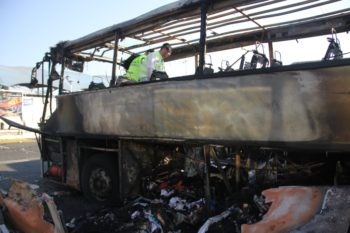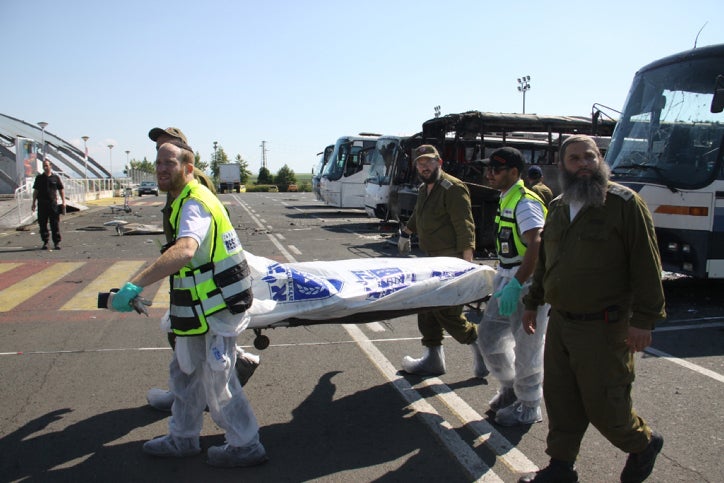
Survivors of the Hezbollah terror attack on the Israeli tour bus in Burgas, Bulgaria, returning to Israel with the help of the Israeli Air Force, July 19, 2012. (Yossi Zeliger/FLASH90)

Israeli ZAKA emergency rescue team examining the remains of the bus at the scene of the Hezbollah terrorist attack in Burgas, Bulgaria, July 19, 2012. (Dano Monkotovic/FLASH90)
WASHINGTON (JTA) – The conviction in Cyprus of a Hezbollah operative plotting to attack Israelis could undercut efforts by the terrorist group to carry out additional attacks outside the Middle East.
Last week’s conviction was the second confirmation in recent months that Hezbollah is active on European soil. The first was when Bulgarian authorities identified the Lebanon-based terrorist group as being behind the July 2012 bombing in Burgas that left six people dead, five of them Israelis. Hezbollah also is believed to be behind recent plots against Israelis and Jews in India, Thailand and Azerbaijan.
The Cyprus conviction makes Europe likelier to list Hezbollah as a terrorist group, and that would bring new restrictions on Hezbollah that would have immediate operational consequences for the group, says Daniel Benjamin, the top counterterrorism official at the State Department in President Obama’s first term.
“If Hezbollah has to increase its operational security in Europe, if it can’t use Europe to fundraise or travel through, it will be challenged to innovate to avoid being caught by European authorities,” Benjamin, now the director of the Dickey Center for International Understanding at Dartmouth College, told JTA.
The Cyprus court found Hossam Taleb Yaacoub guilty of a plot to attack Israeli tourists in the Mediterranean island nation. Yaacoub, who holds Lebanese and Swedish passports, was trained in the use of weapons and scouted sites in Europe, including a Cypriot airport.
Yaacoub acknowledged membership in Hezbollah and staking out areas frequented by Israeli tourists, but said he did not know his work was part of a plot to kill Israelis. The court, which has yet to sentence him, rejected the denial.
The evidence that led to Yaacoub’s conviction helps tip the balance toward listing Hezbollah as a terrorist organization, diplomats from two leading European Union member states told JTA. Hezbollah already is considered a terrorist group by the United States, Israel and several other countries.
“Our position is that we’ve always said that if we have proof that holds up in court, we can enter the procedure,” said Karl-Matthias Klause, the spokesman for the German Embassy in Washington. “There is a general readiness into looking into forbidding the military wing of Hezbollah.”
The other diplomat, whose country has been among those resisting such a classification, said the Cyprus conviction would make it harder not to classify Hezbollah as a terrorist group.
“Bulgaria and Cyprus changes the equation,” said the diplomat, who insisted on anonymity. “The topic becomes one of European solidarity.”
Matthew Levitt, a former counterterrorism analyst at the FBI and a senior terrorism analyst at the Treasury Department in the George W. Bush administration, said he had just returned from meetings in Europe with security and foreign affairs officials.
“No one is debating anymore whether they are terrorists,” said Levitt, who is now a senior fellow analyzing counterterrorism at the Washington Institute for Near East Policy. “Now it’s more, will designating them as terrorist group undermine security in Lebanon? I can have that conversation; it’s a better one than ‘are they terrorists?’ “
The timing is propitious, said Levitt: Hezbollah is reactivating outside the Middle East for the first time in more than a decade, partly because of pressures on its two main sponsors, Iran and Syria. Its recent plots have been more hits than misses, which Levitt attributes to Hezbollah being out of practice and because Iran is rushing the group into staging attacks.
“Now you see in Cyprus what happens when they go back to tradecraft,” Levitt said, referring to Yaacoub’s careful monitoring of the comings and goings of Israeli tourists.
U.S. and Israeli officials for months have been pressing Europe to list Hezbollah as a terrorist group. Obama repeated the call last week during his Israel visit.
“When I think about Israel’s security, I think about five Israelis who boarded a bus in Bulgaria, who were blown up because of where they came from; robbed of the ability to live, and love, and raise families,” Obama told a convention center in Jerusalem packed with cheering university students. “That’s why every country that values justice should call Hezbollah what it truly is: a terrorist organization.”
The diplomat from the country reluctant until recently to list Hezbollah as terrorist said the issue is complicated by the fact that Hezbollah is part of the Lebanese government. Cutting off the group would curtail European influence in Lebanon at an especially sensitive time: Lebanon is absorbing refugees from the Syrian civil war, and there are concerns that the fighting in Syria may spill over into Lebanon.
“We have to keep in mind that Lebanon is very fragile and we have to avoid what could further destabilize it,” the diplomat said.
One possible solution touted in Europe would be to designate Hezbollah’s so-called military wing as terrorist while maintaining ties with its political operation in Lebanon.
The United States recognizes no such distinction, Levitt said, but if Europe wanted to do so, there likely would be no U.S. objection.
“They want to make the distinction for convenience, they want to have leverage, so fine,” he said.
One outcome U.S. officials should oppose, Levitt said, would be to designate only individuals with Hezbollah but not the group as a whole as terrorist.
Benjamin said sparing Hezbollah’s political wing would not be a problem as long as the ban on the military wing made it harder to raise money and run agents.
“A designation worth anything will include a ban on solicitation and fundraising in Europe, and provide the legal predicate for terrorism prosecutions,” he said.
Should Europe take those steps, it could embolden other countries to do so as well, Benjamin said.
“Hezbollah being designated by Europe will embolden other countries to step up cooperation around the world,” he said.

Help ensure Jewish news remains accessible to all. Your donation to the Jewish Telegraphic Agency powers the trusted journalism that has connected Jewish communities worldwide for more than 100 years. With your help, JTA can continue to deliver vital news and insights. Donate today.






